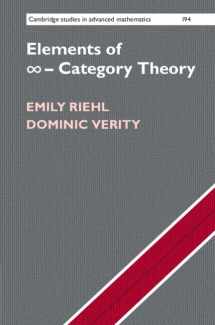
Elements of ∞-Category Theory (Cambridge Studies in Advanced Mathematics, Series Number 194)
Book details
Summary
Description
The language of ∞-categories provides an insightful new way of expressing many results in higher-dimensional mathematics but can be challenging for the uninitiated. To explain what exactly an ∞-category is requires various technical models, raising the question of how they might be compared. To overcome this, a model-independent approach is desired, so that theorems proven with any model would apply to them all. This text develops the theory of ∞-categories from first principles in a model-independent fashion using the axiomatic framework of an ∞-cosmos, the universe in which ∞-categories live as objects. An ∞-cosmos is a fertile setting for the formal category theory of ∞-categories, and in this way the foundational proofs in ∞-category theory closely resemble the classical foundations of ordinary category theory. Equipped with exercises and appendices with background material, this first introduction is meant for students and researchers who have a strong foundation in classical 1-category theory.


We would LOVE it if you could help us and other readers by reviewing the book
Book review



